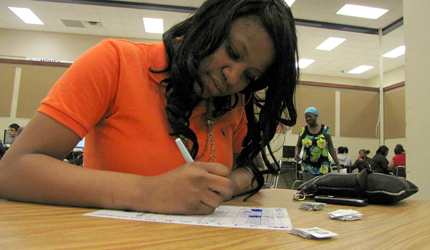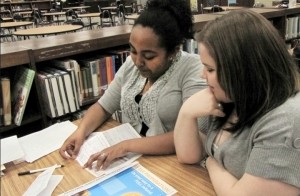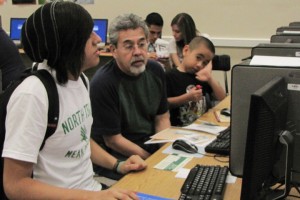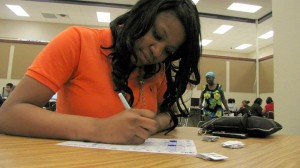Story by Lauren Theall
Photos by Jenna DeWitt
Finance students of the A.J. Moore Academy sing a bittersweet song when telling of their experiences with the late Ron E. Smith, founder of the Volunteer Income Tax Assistance Program. These feelings propel students to excel and give back to the Waco community. High school students with intermediate certification by the IRS volunteer to directly help prepare tax returns at no charge through sponsorship. Students are prepared and constantly practicing their business skills in the classroom.
Smith established VITA with solid intentions of “giving back to the community and helping students,” said finance instructor Marcus Walker.
Smith had experience as chief financial officer of a major corporation and owned a financial consulting firm. Smith also traveled often. He brought his extensive knowledge, expertise and experiences into the classroom.
“Mr. Smith always told us stories about when he traveled and how he succeeded, said academy senior Anahy Cortez. “He gave us a glimpse of the outside world. Now this is what we dream about.”
Smith served as chair for the finance department and taught at the academy for eight years.
The VITA Program operates Monday, Tuesday and Thursday from 5 to 8 p.m., regardless of the school schedule. It is located in the A.J. Moore Academy Library. There are about 60 student volunteers in the program.
A white 3-inch binder sits on the library’s bookcase. This binder contains IRS certifications for each student volunteer. Students may also document their hours served and their progress. All students have signed an agreement not to accept pay for their services.
Students arrive promptly at 5 p.m., ready to put their business skills to work. The process begins when Wacoans enter the library’s right entrance. It is possible to hear the click of a computer’s mouse, clatter of keyboards and light chatter when entering the library. All recipients of the service must go through five “stop signs”, or departments. The stops create a horseshoe around the library.
Citizens are first greeted with a student’s bright smile, at the front desk. Here a student, possibly academy senior Candiss Caballero, will take care of check-in and ask for the proper identification and documents.
The second stop is interviewing. Here, a student such as sophomore Daniel Diaz, will politely chat to obtain information. If the wait is long, volunteers gladly walk around building relationships with others, making the wait as painless as possible. This allows students to interact more with the community. Tax prep is the next stop sign. Senior Joshua Shepard works in this department, among others, to organize information and enter it into the system. The tax return is then printed and sent to stop five, or quality assurance. This department double checks all the work that has been done, helping to minimize the number of tax return rejections. Throughout this process, students have learned to apply their business concepts with interpersonal skills.
Finance instructors Walker and Angelo Ochoa “want the program to succeed under the focus of the students.” This vision has become a reality. Students are required to recertify at the intermediate level annually.
“It is harder than doing taxes,” Shepard said. “For the [certification] exam, we must know the names of forms.”
Students who do not pass the certification exam are not allowed to act as a tax preparer.
The program has existed since 2003, and today students are aware of their success.
“We do a good job and get hands-on experience,” said juniors Reggie Hatfield and Delicia Gibson.
The program’s efficiency has grown from completing 300 returns in 2003, to now completing an average of 1,700 tax returns each year, Walker said.
As of Feb. 23, the students completed a total of “1,044 tax returns in 12 evenings of VITA operation” this tax season, Walker said.
A few of the program’s top volunteers include Amanda Resendez, Enrique Chavira, Jennifer Trimble, Brianna Riley, Gustavo Gonzalez, Ebony Adams, Sadie Walker, Joshua Shepard and Cesar Sanchez. These students have individually completed tax returns.
Local tax companies see the VITA Tax Program as a threat, students said.
“I left school and went to the store one day,” said junior Gustavo Gonzalez. “I was standing near a tax company, and a lady asked me to leave for soliciting another tax company. I was wearing my VITA SWAT, Serving Waco Area Taxpayers, T-shirt. I said we weren’t a company and it’s free.”
Senior Briana Riley had the same experience as she stood near the window of another profiting tax company.
The students in the program see program participants as their family. They care about each others’ success and well-being.
“We are really close-knit,” junior Jennifer Reyes said.
Senior Chris Behler agreed and attributed the feeling to the amount of time the students have spent together.
“Most of us have been together since middle school,” he said.
All of the students said they plan to attend college. Behler plans to prepare for law school and pursue a business minor. Behler has also been offered a job with H & R Block, preparing taxes, upon graduation.
In addition to the program, students learn business and finance through application. This helps students grasp the concepts and form a personable relationship with instructors. Many students feel this enables them to learn better.
“Class runs smoothly, and there is less tension,” sophomore Daniel Diaz said.
Students said they are interested and engaged in the material, due in part to the program’s teaching methods.
“We use Monopoly a lot to learn. The academy isn’t boring, like many people think,” sophomore Ariana Berry said.
In addition to the usual assignments, finance students also run an online eBay store, through the school. For the first time, the finance program will auction off a new car. Applying business concepts learned in class, students decide the price, shipping costs and mediate the return policy. The store serves as an extracurricular activity.
“It is definitely better than reading or reciting a book,” Gibson said.
Walker said this focus on unconventional teaching tools in the program has revealed students’ abilities and interests.
“Without the tax program, we wouldn’t know that some students could excel as they currently do in the program,” he said.
Cortez said this is because the program’s environment encourages students to give their all without becoming an obligation.
“We never feel pressured to volunteer or do assignments. We enjoy what we do,” Cortez said.
Through the program, many students have encountered memorable experiences. The students said they consider these to be unforgettable and life lessons.
“At first I just really wanted to do something for the community and school,” Behler said. “I remember people used to come just for Mr. Smith. He was that warm of a person.”
Finance students said they learn through realistic field experiences, but also from the life of their late mentor.
“We learn based on real-life experiences. We also learned from Mr. Smith’s own experience in his career,” Cortez said.
Before his death, Smith captured the students’ attention with his knowledge about the start of popular companies.
Behler remembers, “Mr. Smith taught us about how the Nike Swoosh was originally bought for $5.”
Students have learned to do things by the book, not compromising ethics.
“Other people do taxes differently, but we do it right,” Gustavo said.





